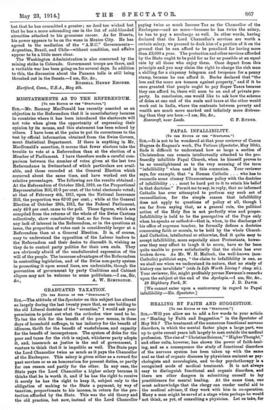PAPAL INFALLIBILITY.
[To vas E01/011 or rue ..Srlc-r■ron."1
Sin,—It is not to be wondered at that your reviewer of Canon Hugues de Ragnau's work, The Vatican (Spectator, May 16th), finds it difficult to understand bow so large a section of Christendom can remain intellectually attached to the pro- fessedly infallible Papal Church, when he himself proves to be so unenlightened as to the very meaning of the term "infallibility" when used in this connexion. Your reviewer says, for example, that "a Roman Catholic . . , who has to reconcile some clumsy Ultramontane policy with the doctrine of infallibility . . . must be bard put to it to retain his belief in that doctrine." Permit me to say, in reply, that no informed Catholic has ever attempted to perform any such act of reconciliation, for the simple reason that infallibility does not apply to questions of policy at all, though 1 am far from Baying that, as a general rule, the political action of the Holy See is not perfectly wise and proper. Infallibility is held to be the prerogative of the Pope only when be speaks ex cathedrci—tbat is, when, in the discharge of his office of supreme teacher, be formally defines a doctrine concerning faith or morale, to be held by the whole Church. And Catholics, intellectual or otherwise, find it quite easy to accept infallibility, more especially since Protestants, howso- ever they may affect to laugh it to scorn, have so far been quite unable to prove satisfactorily that the claim has ever broken down. As Mr. W. H. Mallock, the well-known (non- Catholic) publicist says, " the claim to infallibility is one, as we shall see when we understand its nature, that no study of history can invalidate" (vide Is Life Worth Living ? chap. Your reviewer, Sir, might profitably peruse Newman's remarks upon the subject at the end of the Apologia.—I am, Sir, dtc., 39 Highbury Park, N. J. D. Davis. We cannot enter upon a controversy in regard to Papal infallibility.—En. Spectator.]














































 Previous page
Previous page